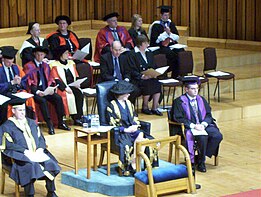University of London Worldwide: Difference between revisions
Restored OU link. See Discussion page |
No edit summary |
||
| Line 22: | Line 22: | ||
==Background== |
==Background== |
||
The External Programme was established in [[1858]]. |
The External Programme was established in [[1858]]. It offers [[undergraduate]] and [[postgraduate]] diplomas and degrees to students worldwide. Currently, there are roughly 40,000 students in the process of earning credentials. A designated constituent institution of the University of London called the "lead college" (e.g. [[Royal Holloway]]) creates materials to allow students to study at their own pace. Examinations take place at testing centers around the world on specified dates. Hallmarks of the program are: |
||
* its low cost vis-à-vis attendance in [[London]], |
* its low cost vis-à-vis attendance in [[London]], |
||
* choice of flexibility between full and part-time study |
* choice of flexibility between full and part-time study |
||
Revision as of 04:18, 14 March 2007
| ULEP logo | |
| Type | Distance education |
|---|---|
| Established | 1858 |
| Dean | Jonathan Kydd |
| Students | 40,000 [1] |
| Location | , |
| Website | http://www.londonexternal.ac.uk |

The University of London External Programme is the external degree granting portion of the University of London.
Background
The External Programme was established in 1858. It offers undergraduate and postgraduate diplomas and degrees to students worldwide. Currently, there are roughly 40,000 students in the process of earning credentials. A designated constituent institution of the University of London called the "lead college" (e.g. Royal Holloway) creates materials to allow students to study at their own pace. Examinations take place at testing centers around the world on specified dates. Hallmarks of the program are:
- its low cost vis-à-vis attendance in London,
- choice of flexibility between full and part-time study
As stated by the University Statute, External Programme students are graded on the same standard as internal students to ensure a uniform credentialing process.[2] A pupil who completes a course of study under the program is awarded a University of London degree, and should there be a lead college, a notation specifying which institution provided the instruction. As stated in a recent open letter written by the University, in 2005 the Quality Assurance Agency (QAA) confirmed that confidence can be placed in the University’s management and awards made through the external system. [3]
Undergraduate Programmes
The External Programme offers a variety of undergraduate qualifications[4]. Some of the more popular courses include Economic and Finance, English, and Laws.
Postgraduate Programmes
The External Programme offers taught postgraduate qualifications in a variety of Arts and Science disciplines [5].
New Programmes
In 2007, the External Programme introduced several new Masters Degrees and a BSc in Creative Computing.
Notably, Imperial College is no longer the only provider of the MBA in the Programme with SOAS and Royal Holloway introducing new MBAs as well.
Private Tuition
In the Middle East, South Asia and East Asia, many students on the External programme seek out tuition at private or non-profit schools which charge additional fees for instruction in preparation for examinations. Such institutions may be audited (although many are not), and if found to be of a respectable standard, may earn the designation of “permission to teach.” The designation serves both as a means of signalling to students some degree of quality in the services offered (although the University of London examiners frequently note that they do not wish for pupils to interpret the sanction as such), and secondly designates places which are allowed to offer the undergraduate diplomas in the fields of law and economics (the only courses mandating formal schooling of some sort).
Current Issues
There have been debates about what status external students have with respect to their lead college. Some institutions embrace external students and treat them as full alumni in addition to their status as University of London alumni. However, other colleges deny external students alumni status and privileges when present in London.
Furthermore, local preparation centers not audited by the External Programme have also been known to falsely represent the credentials being offered, stressing the role of the leading University of London college while neglecting to emphasize that the University of London at large is in fact in charge of the program and conferral of degrees. The University often takes legal measures to correct such false advertising.
Three prominent lead colleges, King's College London, LSE, and University College London are considering withdrawing from the University. A fourth, Imperial College, will be leaving in 2007 . It is unclear if this will effect the External Programme for which they are the lead colleges.
Notable Alumni
Luisa Diogo, Prime Minister of Mozambique
Gisela Stuart, Member of Parliament for Birmingham Edgbaston
